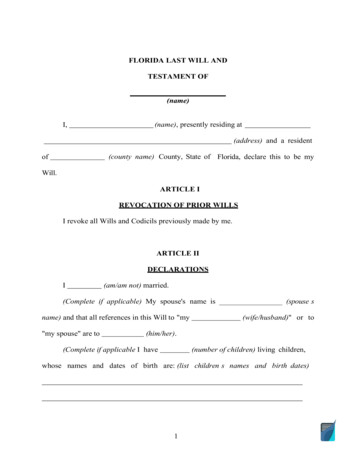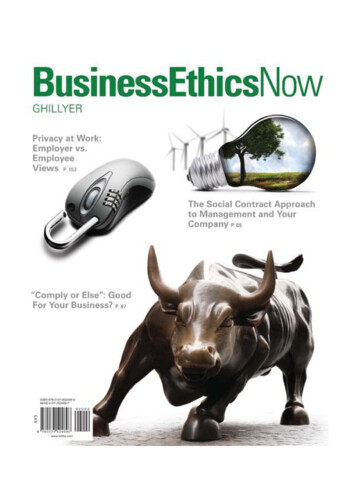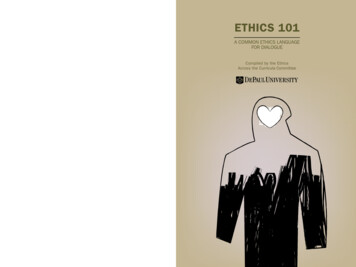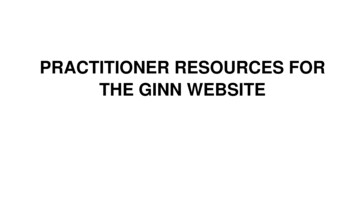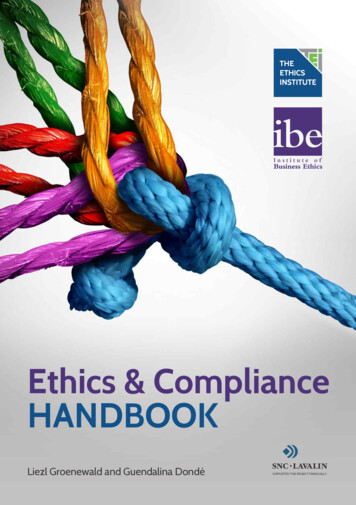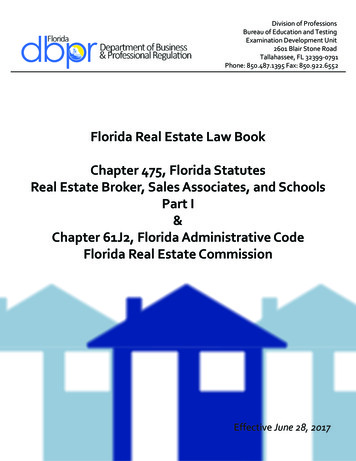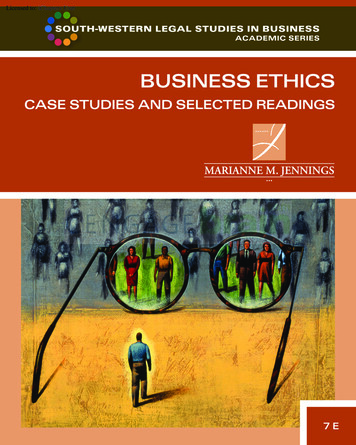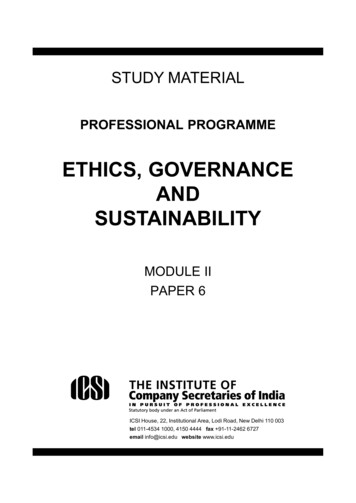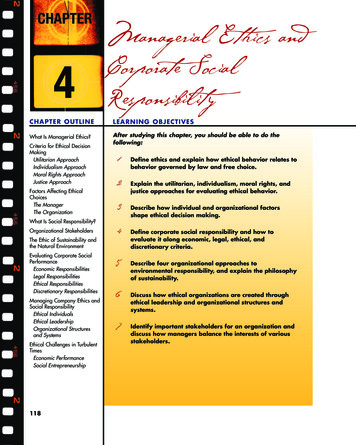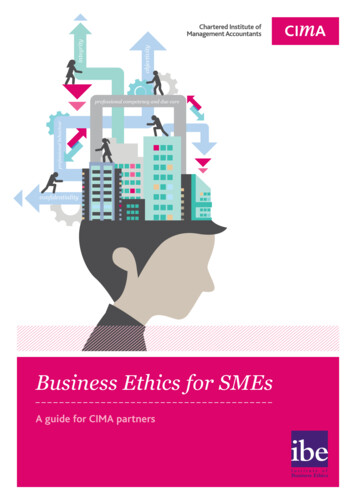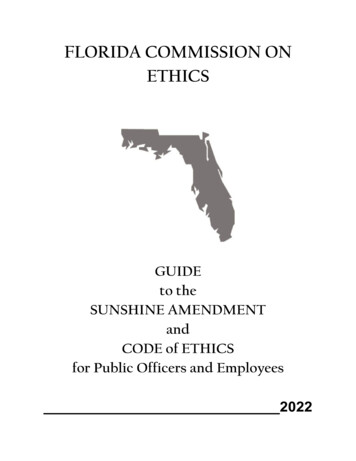
Transcription
FLORIDA COMMISSION ONETHICSGUIDEto theSUNSHINE AMENDMENTandCODE of ETHICSfor Public Officers and Employees2022
State of FloridaCOMMISSION ON ETHICSMichelle AnchorsFort Walton BeachAntonio CarvajalTallahasseeTravis CummingsFleming IslandDon GaetzNicevilleGlenton “Glen” Gilzean, Jr.OrlandoJohn GrantTampaJoanne LeznoffFernandina BeachWilliam “Willie” N. MeggsTallahasseeJim WaldmanFort LauderdaleKerrie StillmanExecutive DirectorP.O. Drawer 15709Tallahassee, FL 32317‐5709www.ethics.state.fl.us(850) 488‐7864**Please direct all requests for information to this number.
TABLE OF CONTENTSI. HISTORY OF FLORIDA’S ETHICS LAWS. 1II. ROLE OF THE COMMISSION ON ETHICS . 2III. THE ETHICS LAWS. 2A. PROHIBITED ACTIONS OR CONDUCT . 31. Solicitation or Acceptance of Gifts . 32. Unauthorized Compensation . 33. Misuse of Public Position . 44. Abuse of Public Position . 45. Disclosure or Use of Certain Information. 46. Solicitation or Acceptance of Honoraria . 4B. PROHIBITED EMPLOYMENT AND BUSINESS RELATIONSHIPS 51. Doing Business With One’s Agency . 52. Conflicting Employment or Contractual Relationship . 53. Exemptions . 54. Additional Exemption . 65. Lobbying State Agencies by Legislators. 76. Employees Holding Office . 77. Professional & Occupational Licensing Board Members . 78. Contractual Services: Prohibited Employment . 79. Local Government Attorneys . 710. Dual Public Employment . 7C. RESTRICTIONS ON APPOINTING, EMPLOYING, AND CONTRACTINGWITH RELATIVES . 81. Anti‐Nepotism Law . 82. Additional Restrictions . 8D. POST OFFICEHOLDING & EMPLOYMENT (REVOLVING DOOR) RESTRICTIONS . 81. Lobbying By Former Legislators, Statewide Elected Officers,and Appointed State Officers . 82. Lobbying By Former State Employees. 83. Additional Restrictions on Former State Employees . 94. Lobbying By Former Local Government Officers and Employees . 10E. VOTING CONFLICTS OF INTEREST . 10
F. DISCLOSURES . 111. Form 1 ‐ Limited Financial Disclosure . 112. Form 1F ‐ Final Form 1. 153. Form 2 ‐ Quarterly Client Disclosure . 164. Form 6 ‐ Full and Public Disclosure . 165. Form 6F ‐ Final Form 6. 166. Form 9 ‐ Quarterly Gift Disclosure . 167. Form 10 ‐ Annual Disclosure of Gifts from Governmental Entities andDirect Support Organizations and Honorarium Event‐Related Expenses . 178. Form 30 ‐ Donor’s Quarterly Gift Disclosure . 189. Forms 1X and 6X – Amendments . 18IV. AVAILABILITY OF FORMS . 19V. PENALTIES . 19A. For Violations of the Code of Ethics . 19B. For Violations by Candidates . 19C. For Violations by Former Officers and Employees . 20D. For Lobbyists and Others . 20E. Felony Convictions: Forfeiture of Retirement Benefits . 20F. Automatic Penalties for Failure to File Annual Disclosure . 20VI. ADVISORY OPINIONS. 21A. Who Can Request an Opinion. 21B. How to Request an Opinion . 21C. How to Obtain Published Opinions. 21VII. COMPLAINTS . 21A. Citizen Involvement . 21B. Referrals . 22C. Confidentiality. 22D. How the Complaint Process Works . 22E. Dismissal of Complaint at Any Stage of Disposition . 23F. Statute of Limitations . 23VIII. EXECUTIVE BRANCH LOBBYING . 24IX. WHISTLE‐BLOWER’S ACT . 24X. ADDITIONAL INFORMATION . 25XI. ONLINE TRAINING . 25
I. HISTORY OF FLORIDA’S ETHICS LAWSFlorida has been a leader among the states in establishing ethics standards for public officials andrecognizing the right of citizens to protect the public trust against abuse. Our state Constitution wasrevised in 1968 to require a code of ethics, prescribed by law, for all state employees and non‐judicialofficers prohibiting conflict between public duty and private interests.Florida’s first successful constitutional initiative resulted in the adoption of the SunshineAmendment in 1976, providing additional constitutional guarantees concerning ethics in government.In the area of enforcement, the Sunshine Amendment requires that there be an independentcommission (the Commission on Ethics) to investigate complaints concerning breaches of public trustby public officers and employees other than judges.The Code of Ethics for Public Officers and Employees is found in Chapter 112 (Part III) of the FloridaStatutes. Foremost among the goals of the Code is to promote the public interest and maintain therespect of the people for their government. The Code is also intended to ensure that public officialsconduct themselves independently and impartially, not using their offices for private gain other thancompensation provided by law. While seeking to protect the integrity of government, the Code alsoseeks to avoid the creation of unnecessary barriers to public service.Criminal penalties, which initially applied to violations of the Code, were eliminated in 1974 in favorof administrative enforcement. The Legislature created the Commission on Ethics that year “to serveas guardian of the standards of conduct” for public officials, state and local. Five of the Commission’snine members are appointed by the Governor, and two each are appointed by the President of theSenate and Speaker of the House of Representatives. No more than five Commission members may bemembers of the same political party, and none may be lobbyists, or hold any public employment duringtheir two‐year terms of office. A chair is selected from among the members to serve a one‐year termand may not succeed himself or herself.In 2018, Florida’s Constitutional Revision Commission proposed, and the voters adopted, changesto Article II, Section 8. The earliest of the changes will take effect December 31, 2020, and will prohibitofficials from abusing their position to obtain a disproportionate benefit for themselves or theirspouse, child, or employer, or for a business with which the official contracts or is an officer, partner,director, sole proprietor, or in which the official owns an interest. Other changes made to theConstitution place restrictions on lobbying by certain officeholders and employees, and put additionallimits on lobbying by former public officers and employees. These changes will become effectiveDecember 31, 2022.1
II. ROLE OF THE COMMISSION ON ETHICSIn addition to its constitutional duties regarding the investigation of complaints, the Commission: Renders advisory opinions to public officials; Prescribes forms for public disclosure; Prepares mailing lists of public officials subject to financial disclosure for use by Supervisors ofElections and the Commission in distributing forms and notifying delinquent filers; Makes recommendations to disciplinary officials when appropriate for violations of ethics anddisclosure laws, since it does not impose penalties; Administers the Executive Branch Lobbyist Registration and Reporting Law; Maintains financial disclosure filings of constitutional officers and state officers and employees; and, Administers automatic fines for public officers and employees who fail to timely file required annualfinancial disclosure.III. THE ETHICS LAWSThe ethics laws generally consist of two types of provisions, those prohibiting certain actions orconduct and those requiring that certain disclosures be made to the public. The following descriptionsof these laws have been simplified in an effort to provide notice of their requirements. Therefore, wesuggest that you also review the wording of the actual law. Citations to the appropriate laws are inbrackets.The laws summarized below apply generally to all public officers and employees, state and local,including members of advisory bodies. The principal exception to this broad coverage is the exclusionof judges, as they fall within the jurisdiction of the Judicial Qualifications Commission.Public Service Commission (PSC) members and employees, as well as members of the PSCNominating Council, are subject to additional ethics standards that are enforced by the Commissionon Ethics under Chapter 350, Florida Statutes. Further, members of the governing boards of charterschools are subject to some of the provisions of the Code of Ethics [Sec. 1002.33(26), Fla. Stat.], as arethe officers, directors, chief executive officers and some employees of business entities that serve asthe chief administrative or executive officer or employee of a political subdivision. [Sec. 112.3136, Fla.Stat.].2
A. PROHIBITED ACTIONS OR CONDUCT1. Solicitation and Acceptance of GiftsPublic officers, employees, local government attorneys, and candidates are prohibited fromsoliciting or accepting anything of value, such as a gift, loan, reward, promise of future employment,favor, or service, that is based on an understanding that their vote, official action, or judgment wouldbe influenced by such gift. [Sec. 112.313(2), Fla. Stat.]Persons required to file financial disclosure FORM 1 or FORM 6 (see Part III F of this brochure), andstate procurement employees, are prohibited from soliciting any gift from a political committee,lobbyist who has lobbied the official or his or her agency within the past 12 months, or the partner,firm, employer, or principal of such a lobbyist or from a vendor doing business with the official’sagency. [Sec. 112.3148, Fla. Stat.]Persons required to file FORM 1 or FORM 6, and state procurement employees are prohibited fromdirectly or indirectly accepting a gift worth more than 100 from such a lobbyist, from a partner, firm,employer, or principal of the lobbyist, or from a political committee or vendor doing business withtheir agency. [Sec.112.3148, Fla. Stat.]However, notwithstanding Sec. 112.3148, Fla. Stat., no Executive Branch lobbyist or principal shallmake, directly or indirectly, and no Executive Branch agency official who files FORM 1 or FORM 6 shallknowingly accept, directly or indirectly, any expenditure made for the purpose of lobbying. [Sec.112.3215, Fla. Stat.] Typically, this would include gifts valued at less than 100 that formerly werepermitted under Section 112.3148, Fla. Stat. Similar rules apply to members and employees of theLegislature. However, these laws are not administered by the Commission on Ethics. [Sec. 11.045, Fla.Stat.]Also, persons required to file Form 1 or Form 6, and state procurement employees and membersof their immediate families, are prohibited from accepting any gift from a political committee. [Sec.112.31485, Fla. Stat.]2. Unauthorized CompensationPublic officers or employees, local government attorneys, and their spouses and minor children areprohibited from accepting any compensation, payment, or thing of value when they know, or with theexercise of reasonable care should know, that it is given to influence a vote or other official action.[Sec. 112.313(4), Fla. Stat.]3
3. Misuse of Public PositionPublic officers and employees, and local government attorneys are prohibited from corruptly usingor attempting to use their official positions or the resources thereof to obtain a special privilege orbenefit for themselves or others. [Sec. 112.313(6), Fla. Stat.]4. Abuse of Public PositionPublic officers and employees are prohibited from abusing their public positions in order to obtaina disproportionate benefit for themselves or certain others. [Article II, Section 8(h), FloridaConstitution.]5. Disclosure or Use of Certain InformationPublic officers and employees and local government attorneys are prohibited from disclosing orusing information not available to the public and obtained by reason of their public position, for thepersonal benefit of themselves or others. [Sec. 112.313(8), Fla. Stat.]6. Solicitation or Acceptance of HonorariaPersons required to file financial disclosure FORM 1 or FORM 6 (see Part III F of this brochure), andstate procurement employees, are prohibited from soliciting honoraria related to their public officesor duties. [Sec. 112.3149, Fla. Stat.]Persons required to file FORM 1 or FORM 6, and state procurement employees, are prohibited fromknowingly accepting an honorarium from a political committee, lobbyist who has lobbied the person’sagency within the past 12 months, or the partner, firm, employer, or principal of such a lobbyist, orfrom a vendor doing business with the official’s agency. However, they may accept the payment ofexpenses related to an honorarium event from such individuals or entities, provided that the expensesare disclosed. See Part III F of this brochure. [Sec. 112.3149, Fla. Stat.]Lobbyists and their partners, firms, employers, and principals, as well as political committees andvendors, are prohibited from giving an honorarium to persons required to file FORM 1 or FORM 6 andto state procurement employees. Violations of this law may result in fines of up to 5,000 andprohibitions against lobbying for up to two years. [Sec. 112.3149, Fla. Stat.]However, notwithstanding Sec. 112.3149, Fla. Stat., no Executive Branch or legislative lobbyist orprincipal shall make, directly or indirectly, and no Executive Branch agency official who files FORM 1or FORM 6 shall knowingly accept, directly or indirectly, any expenditure made for the purpose oflobbying. [Sec. 112.3215, Fla. Stat.] This may include honorarium event related expenses that formerly4
were permitted under Sec. 112.3149, Fla. Stat. Similar rules apply to members and employees of theLegislature. However, these laws are not administered by the Commission on Ethics. [Sec. 11.045, Fla.Stat.]B. PROHIBITED EMPLOYMENT AND BUSINESS RELATIONSHIPS1. Doing Business With One’s Agency(a) A public employee acting as a purchasing agent, or public officer acting in an official capacity,is prohibited from purchasing, renting, or leasing any realty, goods, or services for his or her agencyfrom a business entity in which the officer or employee or his or her spouse or child owns more thana 5% interest. [Sec. 112.313(3), Fla. Stat.](b) A public officer or employee, acting in a private capacity, also is prohibited from renting,leasing, or selling any realty, goods, or services to his or her own agency if the officer or employee is astate officer or employee, or, if he or she is an officer or employee of a political subdivision, to thatsubdivision or any of its agencies. [Sec. 112.313(3), Fla. Stat.]2.Conflicting Employment or Contractual Relationship(a) A public officer or employee is prohibited from holding any employment or contract with anybusiness entity or agency regulated by or doing business with his or her public agency. [Sec. 112.313(7),Fla. Stat.](b) A public officer or employee also is prohibited from holding any employment or having acontractual relationship which will pose a frequently recurring conflict between the official’s privateinterests and public duties or which will impede the full and faithful discharge of the official’s publicduties. [Sec. 112.313(7), Fla. Stat.](c) Limited exceptions to this prohibition have been created in the law for legislative bodies, certainspecial tax districts, drainage districts, and persons whose professions or occupations qualify them tohold their public positions.[Sec. 112.313(7)(a) and (b), Fla. Stat.]3. Exemptions—Pursuant to Sec. 112.313(12), Fla. Stat., the prohibitions against doing businesswith one’s agency and having conflicting employment may not apply:(a) When the business is rotated among all qualified suppliers in a city or county.(b) When the business is awarded by sealed, competitive bidding and neither the official nor hisor her spouse or child have attempted to persuade agency personnel to enter the contract. NOTE:5
Disclosure of the interest of the official, spouse, or child and the nature of the business must be filedprior to or at the time of submission of the bid on Commission FORM 3A with the Commission on Ethicsor Supervisor of Elections, depending on whether the official serves at the state or local level.(c) When the purchase or sale is for legal advertising, utilities service, or for passage on a commoncarrier.(d) When an emergency purchase must be made to protect the public health, safety, or welfare.(e) When the business entity is the only source of supply within the political subdivision and thereis full disclosure of the official’s interest to the governing body on Commission FORM 4A.(f) When the aggregate of any such transactions does not exceed 500 in a calendar year.(g) When the business transacted is the deposit of agency funds in a bank of which a county, city,or district official is an officer, director, or stockholder, so long as agency records show that thegoverning body has determined that the member did not favor his or her bank over other qualifiedbanks.(h) When the prohibitions are waived in the case of ADVISORY BOARD MEMBERS by the appointingperson or by a two‐thirds vote of the appointing body (after disclosure on Commission FORM 4A).(i) When the public officer or employee purchases in a private capacity goods or services, at aprice and upon terms available to similarly situated members of the general public, from a businessentity which is doing business with his or her agency.(j) When the public officer or employee in a private capacity purchases goods or services from abusiness entity which is subject to the regulation of his or her agency where the price and terms of thetransaction are available to similarly situated members of the general public and the officer oremployee makes full disclosure of the relationship to the agency head or governing body prior to thetransaction.4. Additional ExemptionsNo elected public officer is in violation of the conflicting employment prohibition when employedby a tax exempt organization contracting with his or her agency so long as the officer is not directly orindirectly compensated as a result of the contract, does not participate in any way in the decision toenter into the contract, abstains from voting on any matter involving the employer, and makes certaindisclosures. [Sec. 112.313(15), Fla. Stat.]6
5. Legislators Lobbying State AgenciesA member of the Legislature is prohibited from representing another person or entity forcompensation during his or her term of office before any state agency other than judicial tribunals.[Art. II, Sec. 8(e), Fla. Const., and Sec. 112.313(9), Fla. Stat.]6. Employees Holding OfficeA public employee is prohibited from being a member of the governing body which serves as his orher employer. [Sec. 112.313(10), Fla. Stat.]7. Professional and Occupational Licensing Board MembersAn officer, director, or administrator of a state, county, or regional professional or occupationalorganization or association, while holding such position, may not serve as a member of a stateexamining or licensing board for the profession or occupation. [Sec. 112.313(11), Fla. Stat.]8. Contractual Services: Prohibited EmploymentA state employee of the executive or judicial branch who participates in the decision‐makingprocess involving a purchase request, who influences the content of any specification or procurementstandard, or who renders advice, investigation, or auditing, regarding his or her agency’s contract forservices, is prohibited from being employed with a person holding such a contract with his or heragency. [Sec. 112.3185(2), Fla. Stat.]9. Local Government AttorneysLocal government attorneys, such as the city attorney or county attorney, and their law firms areprohibited from representing private individuals and entities before the unit of local governmentwhich they serve. A local government attorney cannot recommend or otherwise refer to his or herfirm legal work involving the local government unit unless the attorney’s contract authorizes ormandates the use of that firm. [Sec. 112.313(16), Fla. Stat.]10. Dual Public EmploymentCandidates and elected officers are prohibited from accepting public employment if they know orshould know it is being offered for the purpose of influence. Further, public employment may not beaccepted unless the position was already in existence or was created without the anticipation of theofficial’s interest, was publicly advertised, and the officer had to meet the same qualifications and gothrough the same hiring process as other applicants. For elected public officers already holding public7
employment, no promotion given for the purpose of influence may be accepted, nor may promotionsthat are inconsistent with those given other similarly situated employees. [Sec. 112.3125, Fla. Stat.]C. RESTRICTIONS ON APPOINTING, EMPLOYING, AND CONTRACTING WITH RELATIVES1. Anti‐Nepotism LawA public official is prohibited from seeking for a relative any appointment, employment, promotion,or advancement in the agency in which he or she is serving or over which the official exercisesjurisdiction or control. No person may be appointed, employed, promoted, or advanced in or to aposition in an agency if such action has been advocated by a related public official who is serving in orexercising jurisdiction or control over the agency; this includes relatives of members of collegialgovernment bodies. NOTE: This prohibition does not apply to school districts (except as provided inSec. 1012.23, Fla. Stat.), community colleges and state universities, or to appointments of boards,other than those with land‐planning or zoning responsibilities, in municipalities of fewer than 35,000residents. Also, the approval of budgets does not constitute “jurisdiction or control” for the purposesof this prohibition. This provision does not apply to volunteer emergency medical, firefighting, orpolice service providers. [Sec. 112.3135, Fla. Stat.]2. Additional RestrictionsA state employee of the executive or judicial branch or the PSC is prohibited from directly orindirectly procuring contractual services for his or her agency from a business entity of which a relativeis an officer, partner, director, or proprietor, or in which the employee, or his or her spouse, or childrenown more than a 5% interest. [Sec. 112.3185(6), Fla. Stat.]D. POST OFFICE HOLDING AND EMPLOYMENT (REVOLVING DOOR) RESTRICTIONS1. Lobbying by Former Legislators, Statewide Elected Officers, and Appointed State OfficersA member of the Legislature or a statewide elected or appointed state official is prohibited for twoyears following vacation of office from representing another person or entity for compensation beforethe government body or agency of which the individual was an officer or member. Former membersof the Legislature are also prohibited for two years from lobbying the executive branch. [Art. II, Sec.8(e), Fla. Const. and Sec. 112.313(9), Fla. Stat.]2. Lobbying by Former State EmployeesCertain employees of the executive and legislative branches of state government are prohibitedfro m personally repres enting another person or entity for co mpensa tio n before the8
agency with which they were employed for a period of two years after leaving their positions, unlessemployed by another agency of state government. [Sec. 112.313(9), Fla. Stat.] These employees includethe following:(a) Executive and legislative branch employees serving in the Senior Management Service and SelectedExempt Service, as well as any person employed by the Department of the Lottery having authority overpolicy or procurement.(b) Persons serving in the following position classifications: the Auditor General; the director of theOffice of Program Policy Analysis and Government Accountability (OPPAGA); the Sergeant at Arms andSecretary of the Senate; the Sergeant at Arms and Clerk of the House of Representatives; the executivedirector and deputy executive director of the Commission on Ethics; an executive director, staffdirector, or deputy staff director of each joint committee, standing committee, or select committee ofthe Legislature; an executive director, staff director, executive assistant, legislative analyst, or attorneyserving in the Office of the President of the Senate, the Office of the Speaker of the House ofRepresentatives, the Senate Majority Party Office, the Senate Minority Party Office, the House MajorityParty Office, or the House Minority Party Office; the Chancellor and Vice‐Chancellors of the StateUniversity System; the general counsel to the Board of Regents; the president, vice presidents, anddeans of each state university; any person hired on a contractual basis and having the power normallyconferred upon such persons, by whatever title; and any person having the power normally conferredupon the above positions.This prohibition does not apply to a person who was employed by the Legislature or other agencyprior to July 1, 1989; who was a defined employee of the State University System or the Public ServiceCommission who held such employment on December 31, 1994; or who reached normal retirementage and retired by July 1, 1991. It does apply to OPS employees.PENALTIES: Persons found in violation of this section are subject
Florida's first successful constitutional initiative resulted in the adoption of the Sunshine Amendment in 1976, providing additional constitutional guarantees concerning ethics in government. . A chair is selected from among the members to serve a one‐year term and may not succeed himself or herself. . exercise of reasonable care .
